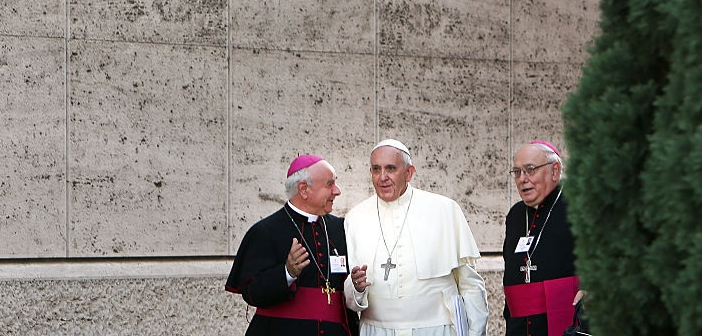Archbishop Vincenzo Paglia — the new head of the Pontifical Academy for Life and the John Paul II Institute for Studies on Marriage and Family – recently gave an interview to Vatican Radio. On 21 August 2016, Radio Vatikan, the German branch of Vatican Radio, reported the following:
With these new appointments, in Paglia’s eyes the pope clearly wants to continue the new course which emanates from the Synod of Bishops [on Marriage and the Family] and his encyclical [sic] Amoris Laetitia. [my emphasis added]
Paglia also said that he has accepted his new task “with great gratitude.” He then continued:
My previous work has strongly led me into the direction of the concrete, thus the encounter with many ecclesial realities, with many bishops’ conferences; and I understand the pope’s own wish for a kind of acceleration of the nearness of the Church and for the breaching of borders – and with reflection, courage, and creativity. [my emphasis added]
As Radio Vatikan reports, the Vatican had already published on 17 August a hand-written letter from Pope Francis explicitly addressed to Archbishop Paglia in which he praises “the solid knowledge and the great experience” of the archbishop. Pope Francis sees, according to the letter, that Paglia’s earlier work at the Pontifical Council for the Family “bore great spiritual and pastoral fruits.”
Paglia himself further comments in his recent interview with Radio Vatikan that Pope Francis, in view of his new appointments, clearly “wants to develop further, and in an integral way, the cultural and form-giving aspect of the Synod [of Bishops on Marriage and the Family] – and the recent appointment of the head [Bishop Kevin Farrell, of Texas] of a new Dicastery [for the Laity, the Family and Life] is an answer to this very same new pastoral perspective.” Paglia says, according to Radio Vatikan, that the pope wants a “new alliance between practice – the pastoral life – and theological reflection.” With such an alliance, the pope thus wishes to “turn to contemporary society” and to show “God’s mercy.” As Radio Vatikan then adds: “For this reason, Francis wishes that Paglia puts the Study Institute for Marriage and the Family [the John Paul II Institute for Studies on Marriage and Family] on the course of ‘Mercy’.” [my emphasis added]
Very abstractly and somewhat ambiguously, Paglia concludes:
The horizon of mercy encompasses the whole curial reform. Behind this reform is to be found the conviction that not everything leads towards theoretical reflection, but that the Church wants to be the “Prima Lex,” the salvation of souls, the salvation of men, of the families, a help for the whole of society.
With this Vatican interview, Archbishop Paglia seems to signal that it is indeed the intention of Pope Francis to continue his path of stressing the Mercy of God – especially by way of admittance of the “remarried” divorcees to Holy Communion in spite of their own decision to remain in their sinful life-situations – even at the possible expense of the just and also merciful Laws of God.
Numerous recent and earnest public criticisms of the pope’s apostolic exhortation Amoris Laetitia – such as the criticisms expressed by the 45 Theologians and by the Austrian Professor Josef Seifert – have notably been met with silence and even, as it seems, publicly ignored by the pope altogether. With his decision to give Archbishop Paglia (a public promoter of the so-called “Kasper Proposal”) a prominent place within the Curia, the pope makes it clear that he will not likely heed any such acute, yet charitable, criticisms concerning these larger doctrinal matters.


